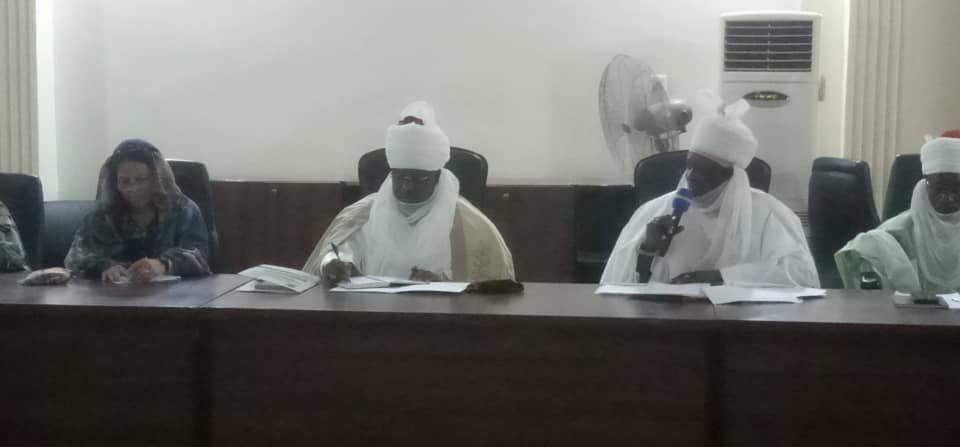News
Emir Urges UNICEF To Use Traditional Institutions In Implementing Programmes

Our Correspondent, Bauchi
The Emir of Dass in Bauchi State, Alhaji Usman Othman has urged UNICEF to make use of traditional institutions for proper dissemination of its programmes.
Othman, also a first class emir made the call in Bauchi at a meeting aimed at addressing health and education related issues between the traditional rulers in the state and UNICEF Representative in Nigeria, Ms Christian Munduate.
He said that this was because the people, especially in the Northern part of the country revere the traditional leaders as they had so much trust in them.
READ ALSO: 75% Nigerian Children Can’t Read, Solve Maths – UNICEF
The royal father stressed the need for the participants to chart a way forward in tackling challenges on maternal health, child survival and out-of-school children.
“Looking at the successes achieved by UNICEF after collaborating with traditional institutions, there came an initiative to expand the scope of the activities.
“We have six emirs across the 20 local government areas in the state, and next in the line of hierarchy are the District Heads who do supervise the village heads and the village heads also supervise the Ward Heads who oversee the cluster of households at the grassroots.
“You could see the chain of communication from top to bottom and bottom up approach, and this trust between the traditional institutions and the people in the community is so much that they do accept and agree to whatever we introduce to them.
“They have that trust that we can’t do anything that will be against their wish and that will destroy their lives or their means of livelihood.
“So, if you come to the north here, whatever you want to introduce, any new innovation that you have, it’s much easier to follow this channel of communications to our people than going alone to execute whatever you feel like doing,” he said.
Responding, Munduate said it was good to heard, learnt and understood the actual situation from the traditional leaders in the state.
READ ALSO: toHand Washing Day: UNICEF Urges Nigeria Govts To Invest In Hand Hygiene
She, however, assured them of UNICEF technical support, adding that each Emirate Council would have comprehensive reports of the locations of every school and primary healthcare facility in their domains.
According to her, this will help in identifying whether there are enough teachers and health workers in the facilities to enable the UN agency to come through collaboration with the state government in addressing the anomalies.
News
Expert Identify Foods That Increase Hypertension Medication’s Effectiveness

Hypertension remains one of the leading causes of premature death worldwide, contributing significantly to heart disease, stroke, and kidney failure. Despite the availability of effective antihypertensive drugs, long-term control of high blood pressure is often challenging because of drug resistance, side effects, and poor adherence.
This has fueled growing scientific interest in complementary strategies that can enhance drug efficacy while minimising toxicity. One promising approach is the combination of conventional antihypertensive medications with herbs and spices in many kitchens.
Recent evidence suggests that augmenting modern antihypertensive drugs with foods rich in p-coumaric acid, a naturally occurring phenolic acid, may offer a novel and effective strategy for blood pressure control.
Phenolic compounds, commonly found in fruits, vegetables, whole grains, and legumes, are known for their antioxidant, anti-inflammatory, and blood vessel–protective properties.
READ ALSO:Russia, China Afraid Of US Under My Administration — Trump
In a study, researchers investigated the combined effects of lisinopril, a widely used antihypertensive drugs and p-coumaric acid on hypertension.
They reported in the Comparative Clinical Pathology that p-coumaric acid enhance the antihypertensive action of lisinopril, potentially allowing for improved blood pressure control without increasing drug dosage.
The study used an established animal model in which hypertension was induced in rats through oral administration of L-NAME, a compound known to suppress nitric oxide production and raise blood pressure.
Following the induction of hypertension, the animals were treated for 14 days with p-coumaric acid (at two different doses), lisinopril alone, or a combination of both.
READ ALSO:Man Suffers Hypertension As Daughter, Grand-daughter Disappear For 10 Years
Untreated hypertensive rats showed significantly elevated activities of key enzymes linked to high blood pressure such as ACE, arginase, acetylcholinesterase, and phosphodiesterase-5 along with increased lipid peroxidation, an indicator of oxidative stress. At the same time, levels of nitric oxide, a critical molecule for blood vessel relaxation, were markedly reduced.
By contrast, rats treated with a combination of lisinopril and p-coumaric acid experienced notable improvements. Blood pressure was better controlled; harmful enzyme activities were reduced, oxidative stress declined, and nitric oxide levels increased. These improvements were mirrored in the tissues the heart compared with untreated hypertensive animals.
They said that the findings suggest that p-coumaric acid may enhance the antihypertensive action of lisinopril, potentially allowing for improved blood pressure control without increasing drug dosage.
This drug–food interaction model is particularly important in the circumstance of long-term hypertension management. Many patients rely on lifelong medication, and strategies that can improve treatment outcomes while reducing side effects are highly desirable.
READ ALSO:Delta Unveils Free Hypertension, Diabetes Screening
The study also reinforces the growing recognition that diet is not merely supportive but can be biologically active in disease control.
The use of medicinal plants and plant-based therapies in the management of hypertension is deeply rooted in traditional medicine across many cultures. While such practices have often existed outside conventional healthcare systems, modern scientific research is now providing evidence-based explanations for their effectiveness.
While these findings are based on animal studies and cannot yet be directly translated into clinical recommendations for humans, they open the door to future research on dietary strategies that can safely complement antihypertensive drugs.
READ ALSO:Why West African Troops Overturned Benin’s Coup But Watched Others Pass
Further clinical studies are needed to determine appropriate dosages, safety profiles, and real-world effectiveness.
In the fight against hypertension, the future may lie not only in new drugs, but also in smarter combinations, where medicine and nutrition work together to deliver better, safer outcomes for patients.
Such nutrition to help maintain healthy blood pressure includes garlic, potatoes, walnuts,tomato and tomato products, legumes and citrus fruits (grapefruits and oranges).
(TRIBUNE)
News
Researchers Develop Treatment For Advanced Prostate Cancer

Researchers at Case Western Reserve University have developed a treatment for advanced prostate cancer that could eliminate a side effect so debilitating that patients often refuse the life-saving therapy.
The innovative approach, according to the researchers, targets prostate cancer cells just as successfully as existing treatments while causing significantly less harm to salivary glands.
For many people with prostate cancer, it relieves the extreme dry mouth that makes speaking, chewing, and swallowing nearly impossible.
According to the findings published in Molecular Imaging and Biology, the treatment targets PSMA (Prostate-Specific Membrane Antigen), a protein present in high numbers on prostate cancer cells.
READ ALSO:Edo Deputy Gov Tasks Lab Scientists On Research, Vaccine Production
Radioligand therapy (RTL) attaches radioactive material to a targeting molecule that acts like a GPS system, guiding the radiation directly to cancer cells while avoiding healthy tissue.
Current PSMA-targeted radioligand therapy is one of the most promising precision cancer treatments for end-stage prostate cancer because it acts as a “smart bomb” that locates and destroys cancer cells.
The downside, however, is that this therapy often causes severe salivary gland damage, resulting in extreme dry mouth that can be so debilitating that patients choose to stop treatment that might save their lives.
James P. Basilion, professor in the Department of Biomedical Engineering at Case Western Reserve and co-leader of the Cancer Imaging Program at the Case Comprehensive Cancer Centre (Case CCC), explained that various strategies to mitigate this side effect have been attempted before, with limited success.
READ ALSO:Nigerian Researcher Develops Wireless Charging Tech For Electric Vehicles
According to the study, PSMA-1-DOTA has a four-fold greater affinity for prostate cancer cells than current therapies.
In addition to having the same tumour-fighting effectiveness as the current standard radioligand therapy, it also significantly reduced damage to the tear and salivary glands, almost eliminating the risk of dry mouth.
This discovery has the potential to significantly alter the treatment of prostate cancer by making PSMA-targeted therapy an earlier intervention rather than a “last resort.”
READ ALSO:Research: Experts Seek Improved Funding Of Monotechnic, Polytechnic Libraries
The research included comprehensive testing on mouse models and in a human patient with metastatic prostate cancer at the Technical University of Munich in Germany.
The patient study confirmed the lab findings, showing the new treatment avoided the salivary glands (potentially preventing dry mouth) while still finding and attacking prostate cancer cells.
The researchers, from now on, are preparing for clinical trials late this year on about 12 prostate patients to validate the promising results and establish the most effective dosing procedures.
(TRIBUNE)
News
Norway ‘Foolishly’ Chose Not To Award Me Nobel Peace Prize Despite Ending Eight Wars — Trump

United States President, Donald Trump, has criticised Norway for not awarding him the Nobel Peace Prize, insisting that his actions on global security and diplomacy merited the honour.
In a post on his Truth Social on Wednesday, Trump said his administration compelled NATO members to significantly increase their defence spending, arguing that many countries were previously failing to meet their financial obligations while the United States bore the burden.
He maintained that his intervention pushed allies to raise defence contributions to five per cent of their gross domestic product, a move he described as previously thought impossible.
The president also claimed that his involvement prevented Russia from fully taking over Ukraine, adding that his absence from global affairs would have emboldened Moscow.
READ ALSO:US Senator Proposes Bill To End Dual Citizenship
He further asserted that he single-handedly brought an end to eight wars, a record he said was overlooked by the Nobel committee in Norway, which is a NATO member.
Trump emphasised that his priority was saving lives rather than receiving awards, stating that millions of lives were preserved through his actions.
He warned that without the United States, NATO would command little fear or respect from rival powers such as Russia and China, and expressed doubt that the alliance would come to America’s aid in a moment of need.
Reaffirming his commitment to NATO, Trump said the United States would continue to support the alliance even if that support was not reciprocated.
READ ALSO:Insecurity: US Congressman Riley Moore Reveals Trump’s Mission In Nigeria
He also credited his leadership with rebuilding the US military during his first term and sustaining its strength, describing the United States as the only nation that Russia and China truly fear and respect.
He wrote, “Remember, for all of those big NATO fans, they were at 2% GDP, and most weren’t paying their bills, UNTIL I CAME ALONG. The USA was, foolishly, paying for them! I, respectfully, got them to 5% GDP, AND THEY PAY, immediately.
“Everyone said that couldn’t be done, but it could, because, beyond all else, they are all my friends. Without my involvement, Russia would have ALL OF UKRAINE right now. Remember, also, I single-handedly ENDED 8 WARS, and Norway, a NATO Member, foolishly chose not to give me the Noble Peace Prize. But that doesn’t matter! What does matter is that I saved Millions of Lives.
“RUSSIA AND CHINA HAVE ZERO FEAR OF NATO WITHOUT THE UNITED STATES, AND I DOUBT NATO WOULD BE THERE FOR US IF WE REALLY NEEDED THEM. EVERYONE IS LUCKY THAT I REBUILT OUR MILITARY IN MY FIRST TERM, AND CONTINUE TO DO SO. We will always be there for NATO, even if they won’t be there for us. The only Nation that China and Russia fear and respect is the DJT REBUILT U.S.A. MAKE AMERICA GREAT AGAIN!!! President DJT.”

 News4 days ago
News4 days agoWhat I Saw After A Lady Undressed Herself — Pastor Adeboye

 Headline4 days ago
Headline4 days agoPROPHECY: Primate Ayodele Reveals Trump’s Plot Against Tinubu

 Metro4 days ago
Metro4 days agoArmed Robbers Shot PoS Operator To Death In Edo

 Metro3 days ago
Metro3 days agoAAU Disowns Students Over Protest

 Business3 days ago
Business3 days agoNNPCL Reduces Fuel Price Again

 Metro4 days ago
Metro4 days agoJoint Task Force Kills 23 Bandits Fleeing Kano After Attacks

 Metro3 days ago
Metro3 days agoEdo: Suspected Kidnappers Kill Victim, Hold On To Elder Brother

 Metro3 days ago
Metro3 days agoNine Soldiers Feared Dead In Borno IED Explosion

 Politics4 days ago
Politics4 days ago2027: Rivers APC Pledges To Follow Wike’s Instructions

 Metro4 days ago
Metro4 days agoGunmen Demand N200m Ransom For Kidnapped Brothers In Edo




























